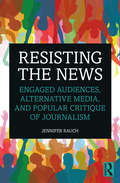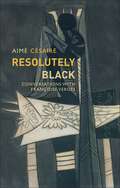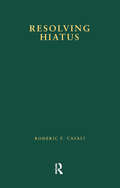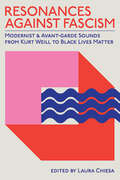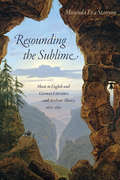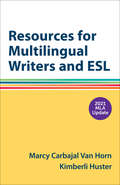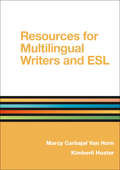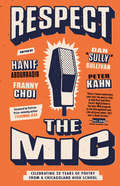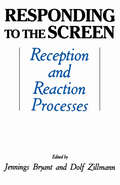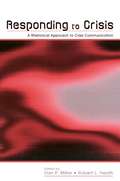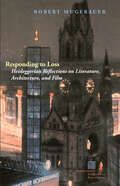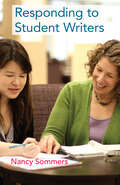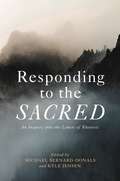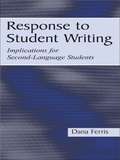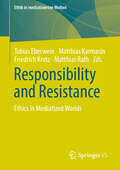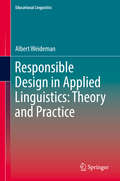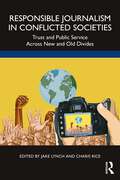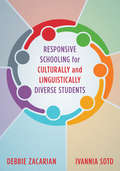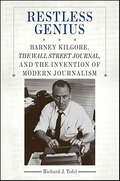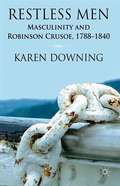- Table View
- List View
Resisting the News: Engaged Audiences, Alternative Media, and Popular Critique of Journalism
by Jennifer RauchResisting the News brings together unique insights from activists and alternative-media users to offer a distinctive perspective on the problems of journalism today—and how to fix them. Using critical-cultural theory and, in particular, the conceptual frameworks of ritual communication and interpretive communities, this book examines how audiences filter their interpretations of mainstream news through the prisms of their identities and experiences with alternative media and political protest. Jennifer Rauch gives voice to alternative-media audiences and illuminates the cultural resources, values, assumptions, critical skills, and discursive strategies through which they make sense of their news environments. Drawing on a 15-year research project, Rauch employs a variety of qualitative, quantitative, and quasi-ethnographic methods, including focus groups, media-use diaries, close-ended surveys, and open-ended questions, to paint a layered portrait of liberal and conservative critiques of journalism. Shedding new light on popular theories about "how news works" and about "mass" audiences, this book will be useful to students, scholars, and teachers of political communication, journalism studies, media studies, and critical-cultural studies.
Resolutely Black: Conversations with Francoise Verges (Critical South)
by Aimé CésaireAimé Césaire’s work is foundational for decolonial and postcolonial thought. His Discourse on Colonialism, first published in 1955, influenced generations of scholars and activists at the forefront of liberation struggles in Africa, Latin America, and the Caribbean and it remains a classic of anticolonial thought. This unique volume takes the form of a series of interviews with Césaire that were conducted by Françoise Vergès in 2004, shortly before his death. Césaire’s responses to Vergès’ questions cover a wide range of topics, including the origins of his political activism, the legacies of slavery and colonialism, the question of reparation for slavery and the problems of marrying literature to politics. The book includes a substantial postface by Vergès in which she situates Césaire’s work in its intellectual and political context. This timely book brings Césaire back into the present-day conversation on race, slavery and the legacy of colonialism. His penetrating insights on these matters should appeal to scholars and students throughout the humanities and social sciences as well as to the general public.
Resolving Hiatus (Outstanding Dissertations in Linguistics)
by Roderic F. CasaliFirst published in 1998. Part of the Outstanding Dissertations in Linguistics series, this work looks at the analysis of elision directionaility and the correlation between the active value of (ATR) in a language and the language's vowel inventory. The paper develops the idea of ATR Predictability.
Resonances against Fascism: Modernist and Avant-Garde Sounds from Kurt Weill to Black Lives Matter (SUNY series, Humanities to the Rescue)
by Laura ChiesaResonances against Fascism explores some of the myriad ways music and, more broadly, sound have emerged from, and been mobilized to address, the urgencies of the present, from modernism to today. Taking the works and life of the German-born composer Kurt Weill as a pivotal point of departure, the collection brings together a range of critical voices, each with a singular tone, to demonstrate the pervasive force of sound in the face of fascism. Across eight essays, contributors sound out the anti-authoritarian resonances of modernist and avant-garde aesthetics from Weill to Nina Simone and Chico Buarque, to Marguerite Duras and Jean-Luc Godard, to Lou Reed and Patti Smith, and to the choral chants of the Black Lives Matter Movement. The second volume in the Humanities to the Rescue book series, a public humanities project dedicated to discussing the role of the arts and humanities today, Resonances against Fascism takes its cue from the disruptive force of music in traversing the boundaries between—and engaging readers from—modernist and avant-garde studies, critical and cultural theory, musicology and sound studies, critical race and gender studies, performance studies, and philosophy.
Resounding the Sublime: Music in English and German Literature and Aesthetic Theory, 1670-1850 (Sound in History)
by Miranda Eva StanyonWhat does the sublime sound like? Harmonious, discordant, noisy, rustling, silent? Miranda Eva Stanyon rereads and resounds this crucial aesthetic category in English and German literatures of the long eighteenth century from a musical perspective and shows how sonorous sublimes lay at the heart of a central and transformative discourse. For Enlightenment and Romantic era listeners, the musical sublime represented a sonic encounter of the most extreme kind, one that tested what humans were capable of feeling, imagining, thinking, and therefore becoming.The sublime and music have not always sung from the same hymn sheet, Stanyon observes. She charts an antagonistic intimacy between the two, from the sublime's rise to prominence in the later seventeenth century, through the upheavals associated with Kant in the late eighteenth century, and their reverberations in the nineteenth. Offering readings of canonical texts by Longinus, Dryden, Burke, Klopstock, Herder, Coleridge, De Quincey, and others alongside lesser-known figures, she shows how the literary sublime was inextricable from musical culture, from folksongs and ballads to psalmody, polychoral sacred music, and opera. Deeply interdisciplinary, Resounding the Sublime draws literature into dialogue with sound studies, musicology, and intellectual and cultural history to offer new perspectives on the sublime as a phenomenon which crossed media, disciplines, and cultures.An interdisciplinary study of sound in history, the book recovers varieties of the sublime crucial for understanding both the period it covers and the genealogy of modern and postmodern aesthetic discourses. In resounding the sublime, Stanyon reveals a phenomenon which was always already resonant. The sublime emerges not only as the aesthetic of the violently powerful, a-rational, or unrepresentable, but as a variegated discourse with competing dissonant, harmonious, rustling, noisy, and silent strains, one in which music and sound illustrate deep divisions over issues of power, reason, and representation.
Resources for Multilingual Writers and ESL with 2021 MLA Update: A Hacker Handbooks Supplement
by Diana Hacker Nancy Sommers Kimberli Huster Marcy Carbajal Van HornThis ebook has been updated to provide you with the latest guidance on documenting sources in MLA style and follows the guidelines set forth in the MLA Handbook, 9th edition (April 2021).This supplement both resident and international students understand college expectations and develop strategies for improving their academic English and academic writing. Written by an ESL expert, Resources for Multilingual Writers and ESL includes plenty of helpful charts, activities, exercises, and model papers — along with notes about where to find additional resources online and on campus.
Resources for Multilingual Writers and ESL: A Hacker Handbooks Supplement
by Kimberli Huster Marcy Carbajal Van HornThis supplement both resident and international students understand college expectations and develop strategies for improving their academic English and academic writing. Written by an ESL expert, this booklet includes plenty of helpful charts, activities, exercises, and model papers -- along with notes about where to find additional resources online and on campus.
Respect the Mic: Celebrating 20 Years of Poetry from a Chicagoland High School
by Tyehimba Jess Franny Choi Hanif Abdurraqib Peter Kahn Dan Sully" SullivanAn expansive, moving poetry anthology, representing 20 years of poetry from students and alumni of Chicago's Oak Park River Forest High School Spoken Word Club."Poets I know sometimes joke that the poetry club at Oak Park River Forest High School is the best MFA program in the Chicagoland area. Like all great jokes, this one is dead serious." -Eve L. Ewing, award-winning poet, playwright, scholar, and sociologist For Chicago's Oak Park and River Forest High School's Spoken Word Club, there is one phrase that reigns supreme: Respect the Mic. It's been the club's call to arms since its inception in 1999. As its founder Peter Kahn says, "It's a call of pride and history and tradition and hope." This vivid new collection of poetry and prose -- curated by award-winning and bestselling poets Hanif Abdurraqib, Franny Choi, Peter Kahn, and Dan "Sully" Sullivan -- illuminates just that, uplifting the incredible legacy this community has cultivated. Among the dozens of current students and alumni, Respect the Mic features work by NBA champion Iman Shumpert, National Youth Poet Laureate Kara Jackson, National Youth Poet Laureate Kara Jackson, National Student Poet Natalie Richardson, comedian Langston Kerman, and more.In its pages, you hear the sprawling echoes of students, siblings, lovers, new parents, athletes, entertainers, scientists, and more --all sharing a deep appreciation for the power of storytelling. A celebration of the past, a balm for the present, and a blueprint for the future, Respect the Mic offers a tender, intimate portrait of American life, and conveys how in a world increasingly defined by separation, poetry has the capacity to bind us together.
Responding To Literature: Reading Strategies and Test Practice
by EMC CorporationEMC Write in Reader helps the readers to interact with reading selections as it guides them through the reading strategies,-- reading tools that aid you to get the most out of your reading materials
Responding To the Screen: Reception and Reaction Processes (Routledge Communication Series)
by Jennings Bryant Dolf ZillmannThis volume takes the next step in the evolution of mass communication research tradition from effects to processes -- a more detailed and microanalytical analysis of the psychological processes involved in receiving and reacting to electronic media messages. This domain includes investigations into those psychological processes that occur between the process of selecting media messages for consumption and assessments of whatever processes mediate the long-term impact such message consumption may have on consumers' subsequent behavior. The editors strive to further understanding of some of the basic processes underlying the ways we gain entertainment and information.
Responding to Crisis: A Rhetorical Approach to Crisis Communication (Routledge Communication Series)
by Robert L. Heath Dan P. MillarIn recent years, researchers and practitioners have explored the nature, theory, and best practices that are required for effective and ethical crisis preparation and response. The consequences of being unprepared to respond quickly, appropriately, and ethically to a crisis are dramatic and well documented. For this reason, crisis consulting and the development of crisis response plans and protocols have become more than a cottage industry. Taking a rhetorical view of crisis events and utterances, this book is devoted to adding new insights to the discussion, and to describing a rhetorical approach to crisis communication. To help set the tone for that description, the opening chapter reviews a rhetorical perspective on organizational crisis. As such it raises questions and provokes issues more than it addresses and answers them definitively. The other chapters can be viewed as a series of experts participating in a panel discussion. The challenge to each of the authors is to add depth and breadth of understanding to the analysis of the rhetorical implications of a crisis, as well as to the strategies that can be used ethically and responsibly. Central to this analysis is the theoretic perspective that crisis response requires rhetorically tailored statements that satisfactorily address the narratives surrounding the crisis which are used by interested parties to define and judge it. This volume will be of value to scholars and students interested in crisis communication, and is certain to influence future work and research on responding to crises.
Responding to Literature (Blue Level)
by Susan Duffy Schaffrath Ursula Mcpike David W. Foote Brenda P. PerkinsA literature and language arts textbook
Responding to Literature: American Literature
by Arthur N. Applebee Judith A. Langer Julie West JohnsonAmerican Literature textbook
Responding to Literature: World Literature
by Mary Hynes-Berry Basia C. Miller Susan D. Schaffrath Rebecca Hankin Ted Johnson Ursula McpikeResponding to Literature is a series for the way you really read, the way you really think, the way you really write. As you use this book in the series, you will learn new ways of exploring literature, and you will discover personal meanings in works that are part of your literary heritage.
Responding to Loss: Heideggerian Reflections on Literature, Architecture, and Film (Perspectives in Continental Philosophy)
by Robert MugerauerMuch recent philosophical work proposes to illuminate dilemmas of human existence with reference to the arts and culture, often to the point of submitting particular works to preconceived formulations. In this examination of three texts that respond to loss, Robert Mugerauer responds with close, detailed readings that seek to clarify the particularity of the intense force such works bring forth. Mugerauer shows how, in the face of what is irrevocably taken away as well as of what continues to be given, the unavoidable task of interpretation is ours alone.Mugerauer examines works in three different forms that powerfully call on us to respond to loss: Cormac McCarthy’s The Crossing, Daniel Libeskind’s Jewish Museum Berlin, and Wim Wenders’s film Wings of Desire. Explicating these difficult but rich works with reference to the thought of Martin Heidegger, Jean-Luc Marion, Hannah Arendt, and Emmanuel Levinas, the author helps us to experience the multiple and diverse ways in which all of us are opened to the saturated phenomena of loss, violence, witnessing, and responsibility.
Responding to Student Writers
by Nancy SommersOffering a model for thinking about response as a dialogue between students and teachers, Responding to Student Writers is a brief instructor resource which gets you thinking about the benefits of responding to writers and their writing.
Responding to the Sacred: An Inquiry into the Limits of Rhetoric
by Michael Bernard-Donals and Kyle JensenWith language we name and define all things, and by studying our use of language, rhetoricians can provide an account of these things and thus of our lived experience. The concept of the sacred, however, raises the prospect of the existence of phenomena that transcend the human and physical and cannot be expressed fully by language. The sacred thus reveals limitations to rhetoric.Featuring essays by some of the foremost scholars of rhetoric working today, this wide-ranging collection of theoretical and methodological studies takes seriously the possibility of the sacred and the challenge it poses to rhetorical inquiry. The contributors engage with religious rhetorics—Jewish, Jesuit, Buddhist, pagan—as well as rationalist, scientific, and postmodern rhetorics, studying, for example, divination in the Platonic tradition, Thomas Hobbes’s and Walter Benjamin’s accounts of sacred texts, the uncanny algorithms of Big Data, and Hélène Cixous’s sacred passages and passwords. From these studies, new definitions of the sacred emerge—along with new rhetorical practices for engaging with the sacred.This book provides insight into the relation of rhetoric and the sacred, showing the capacity of rhetoric to study the ineffable but also shedding light on the boundaries between them.
Responding to the Sacred: An Inquiry into the Limits of Rhetoric
by Michael Bernard-Donals and Kyle JensenWith language we name and define all things, and by studying our use of language, rhetoricians can provide an account of these things and thus of our lived experience. The concept of the sacred, however, raises the prospect of the existence of phenomena that transcend the human and physical and cannot be expressed fully by language. The sacred thus reveals limitations of rhetoric.Featuring essays by some of the foremost scholars of rhetoric working today, this wide-ranging collection of theoretical and methodological studies takes seriously the possibility of the sacred and the challenge it poses to rhetorical inquiry. The contributors engage with religious rhetorics—Jewish, Jesuit, Buddhist, pagan—as well as rationalist, scientific, and postmodern rhetorics, studying, for example, divination in the Platonic tradition, Thomas Hobbes’s and Walter Benjamin’s accounts of sacred texts, the uncanny algorithms of Big Data, and Hélène Cixous’s sacred passages and passwords. From these studies, new definitions of the sacred emerge—along with new rhetorical practices for engaging with the sacred.This book provides insight into the relation of rhetoric and the sacred, showing the capacity of rhetoric to study the ineffable but also shedding light on the boundaries between them.In addition to the editors, the contributors to this volume include Michelle Ballif, Jean Bessette, Trey Conner, Richard Doyle, David Frank, Daniel M. Gross, Kevin Hamilton, Cynthia Haynes, Steven Mailloux, James R. Martel, Jodie Nicotra, Ned O’Gorman, and Brooke Rollins.
Response To Student Writing: Implications for Second Language Students
by Dana R. FerrisThis volume synthesizes and critically analyzes the literature on response to the writing of second language students, and discusses the implications of the research for teaching practice in the areas of written and oral teacher commentary on student writing, error correction, and facilitation of peer response. The book features numerous examples of student texts and teacher commentary, as well as figures and appendices that summarize research findings and present sample lessons and other teaching materials. It is thus simultaneously comprehensive in its approach to the existing research and highly practical in showing current and future teachers how this material applies to their everyday endeavors of responding to student writing and teaching composition classes. Response to student writing--whether it takes the form of teachers' written feedback on content, error correction, teacher-student conferences, or peer response--is an extremely important component of teaching second language writing. Probably no single activity takes more teacher time and energy. Response to Student Writing is a valuable theoretical and practical resource for those involved in this crucial work, including L2 composition researchers, in-service and preservice teachers of ESOL/EFL writers, and teacher educators preparing graduate students for the teaching of writing.
Responsibility and Resistance: Ethics in Mediatized Worlds (Ethik in mediatisierten Welten)
by Matthias Rath Matthias Karmasin Friedrich Krotz Tobias EberweinThe volume deals with the normative challenges and the ethical questions imposed by, and through, the developments and changes in everyday life, culture and society in the context of media change. It is thus concerned with the questions of whether and how the central concept of (enlightened) ethics must evolve under these premises – or in other words: what form do ethics take in mediatized societies? In order to address this question and to stimulate and initiate a debate, the authors focus on two concepts: responsibility and resistance. Their contributions try to shed light not only on the empirical shreds of evidence of change in mediatized societies, but also on the normative challenges and ethical possibilities of these developments.
Responsible Design in Applied Linguistics: Theory and Practice
by Albert WeidemanNo mere history of applied linguistics, this volume presents a framework for interpreting the development of applied linguistics as a discipline. It offers a systematic account of how applied linguistics has developed, articulating the philosophical premises that have informed both its emergence and its subsequent growth. It asks questions that are seldom asked: Where does the discipline derive from? Where is it heading? What directions has it already taken? Which direction should it should it embrace in future? What is the relative worth of all of the variation in design and methods that have been developed by applied linguists? In defining applied linguistics as a discipline of design, it takes us beyond the diffuse and sometimes contradictory conventional definitions of the field. The framework of design principles it proposes not only helps to explain the historical development of applied linguistics, but also provides a potential justification for solutions to language problems. It presents us with nothing less than an emerging theory of applied linguistics.
Responsible Journalism in Conflicted Societies: Trust and Public Service Across New and Old Divides
by Charis RiceSetting out multiple perspectives from media and journalism scholars, this collection addresses the implications that today’s technological, socio-political, and economic conditions have for relations between journalists, sources, audiences, and wider publics. Applying an inclusive concept of ‘conflicted societies’ that goes beyond those affected by violent conflict to include traditionally ‘stable’ but increasingly polarised democracies, such as the UK and the USA, contributors engage with longstanding questions and new challenges surrounding concepts of responsibility, trust, public service, and public interest in journalism. The unique span of studies offers international scope, including societies often overlooked in media and journalism studies, such as Northern Ireland, Turkey, Cyprus, Pakistan, The Democratic Republic of Congo, and the Central African Republic. Chapters also feature contemporary case studies, such as the COVID-19 pandemic, as a route into understanding the pertinent issue of fake news, and the ‘local turn’ in journalism. Responsible Journalism in Conflicted Societies is not only a valuable resource for those studying conflict reporting and international journalism but will also appeal to scholars working at the intersection of media, journalism, communication, peace, conflict, and security studies.
Responsive Schooling for Culturally and Linguistically Diverse Students
by Debbie Zacarian Ivannia SotoA strengths-based approach to making sure what we teach is central to who we teach. Rapidly changing and diverse student populations necessitate culturally responsive schooling. It can be a challenging balancing act for educators to respect diversity and teach to each student’s needs while adhering to restrictive curricula that mandate the use of standard English. Responsive Schooling for Culturally and Linguistically Diverse Students offers a balanced approach to developing students’ academic language proficiency while simultaneously honoring, acknowledging, and valuing the richness of their home and community languages and cultures. Debbie Zacarian and Ivannia Soto provide a practical framework within which schools and educators can make students’ personal, cultural, and social identities central to the curriculum by drawing on the experiences and interests they bring to the classroom. Filled with examples of responsive teaching and opportunities to reflect on current practice, the book is a rich resource for teachers and school leaders alike.
Restless Genius: Barney Kilgore, the Wall Street Journal, and the Invention of Modern Journalism
by Richard J. TofelThe story of the man who transformed The Wall Street Journal and modern mediaIn 1929, Barney Kilgore, fresh from college in small-town Indiana, took a sleepy, near bankrupt New York financial paper—The Wall Street Journal—and turned it into a thriving national newspaper that eventually was worth $5 billion to Rupert Murdoch. Kilgore then invented a national weekly newspaper that was a precursor of many trends we see playing out in journalism now.Tofel brings this story of a little-known pioneer to life using many previously uncollected newspaper writings by Kilgore and a treasure trove of letters between Kilgore and his father, all of which detail the invention of much of what we like best about modern newspapers. By focusing on the man, his journalism, his foresight, and his business acumen, Restless Genius also sheds new light on the Depression and the New Deal.At a time when traditional newspapers are under increasing threat, Barney Kilgore's story offers lessons that need constant retelling.
Restless Men: Masculinity and Robinson Crusoe, 1788–1840
by Karen DowningRobinson Crusoe's call to adventure and do-it-yourself settlement resonated with British explorers. In tracing the links in a discursive chain through which a particular male subjectivity was forged, Karen Downing reveals how such men took their tensions with them to Australia, so that the colonies never were a solution to restless men's anxieties.
